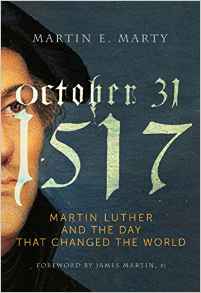 Martin E. Marty, October 31, 1517: Martin Luther and the Day That Changed the World (Brewster: Paraclete Press, 2016), 114pp.
Martin E. Marty, October 31, 1517: Martin Luther and the Day That Changed the World (Brewster: Paraclete Press, 2016), 114pp.
This coming fall, on October 31, 2017, the town of Wittenberg in Germany will host the 500th anniversary of Martin Luther nailing his Ninety-Five Theses to the door of the Castle Church and thus kick-starting the Protestant Reformation. The town, which has a population of 50,000, is expecting 400,000 tourists. Martin Marty (b. 1928), an ordained Lutheran pastor, Fairfax M. Cone Distinguished Service Professor at the University of Chicago, author of sixty books, and for the last fifty years perhaps the premier scholar on American religion, is the perfect person to offer his own reflections on this anniversary of one of the most important pivot points in western history.
How was it, he asks, that a young monk, at a new university, in an obscure little town, lit the fuse and touched such a nerve as to convulse all of Europe and, eventually, the whole world? It's right there in Thesis #1, says Marty: "When our Lord and master Jesus Christ said 'Repent,' he intended the entire life of believers to be repentance." In the gospel of Mark, the first words spoken by Jesus call us to repentance. This was the "focal point" of all Ninety-Five Theses, even an "obsession" with Luther — "the biblical claim that one is 'made right with God' not through any human effort — the code word then and now was and is 'through good works' — but entirely by divine grace 'through faith.'" Luther's idea, writes Marty, touched "the human heart at its deepest font."
Our lifelong repentance, as Luther puts it in Thesis #2, "cannot be understood as sacramental penance." Repentance best takes place in a church community, but it is ultimately a personal act rather than an ecclesiastical ritual. Repentance — an about face or basic change of heart that leads to changed actions, is central to life rather than peripheral. It's essential rather than dispensable, obligatory and not optional. And contrary to modern misconceptions, when done well, repentance is entirely life-giving rather than death-dealing. Repentance is a movement toward health and wholeness rather than a descent into repression and self-recrimination. As all good Lutherans know, repentance and justification by grace through faith alone lead to a life of joy and freedom.
In his foreword, the Jesuit James Martin calls this a "short book on a big topic written by an expert." What a joy to see Martin Marty writing on Martin Luther at the age of (almost) ninety. As usual for Marty, this book is a combination of intellectual rigor and pastoral wisdom. Interested readers might also want to read his biography of the reformer, Martin Luther (New York: Penguin, 2004).


